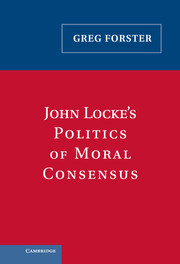Book contents
- Frontmatter
- Contents
- Acknowledgments
- List of Abbreviations
- John Locke's Politics of Moral Consensus
- 1 “Reason Teaches All Mankind, Who Will But Consult It”: John Locke and Moral Consensus
- 2 “Sit Down in Quiet Ignorance”: Locke's Epistemology of Limits
- 3 “The Candle of the Lord”: Locke's Rational Faith
- 4 “The Only Foundation of Faith”: Reasonable Christianity
- 5 “The Only True Touchstone of Moral Rectitude”: The Religious Foundations of Morality
- 6 “'Tis Reasonable to Think the Cause Is Natural”: Locke's Religious Eudemonism
- 7 “The Servants of One Sovereign Master”: Authority and Moral Consensus
- 8 “The Opinion of This or That Philosopher Was of No Authority”: Locke and Us
- Notes
- Bibliography
- Index
5 - “The Only True Touchstone of Moral Rectitude”: The Religious Foundations of Morality
Published online by Cambridge University Press: 17 August 2009
- Frontmatter
- Contents
- Acknowledgments
- List of Abbreviations
- John Locke's Politics of Moral Consensus
- 1 “Reason Teaches All Mankind, Who Will But Consult It”: John Locke and Moral Consensus
- 2 “Sit Down in Quiet Ignorance”: Locke's Epistemology of Limits
- 3 “The Candle of the Lord”: Locke's Rational Faith
- 4 “The Only Foundation of Faith”: Reasonable Christianity
- 5 “The Only True Touchstone of Moral Rectitude”: The Religious Foundations of Morality
- 6 “'Tis Reasonable to Think the Cause Is Natural”: Locke's Religious Eudemonism
- 7 “The Servants of One Sovereign Master”: Authority and Moral Consensus
- 8 “The Opinion of This or That Philosopher Was of No Authority”: Locke and Us
- Notes
- Bibliography
- Index
Summary
Locke held that politics, although it should not be devoted to any particular religion, must ultimately appeal to God's moral authority. The Letter Concerning Toleration argues that the political community ought not be devoted to a particular religion, so one might think that Locke favors the compartmentalization of religion and politics favored by most liberal theorists today. Indeed, some Locke scholars have endorsed this view. But even the argument of the Letter itself tends against this conclusion, and the whole body of Locke's philosophy is grounded on the opposite premise: that the only kind of moral law worthy of the name is religious moral law. To be a moral law properly so called, a law need not be revelatory – it can be discerned in nature instead – but it must bear God's authority. This is why moral consensus is so difficult to build; it must appeal to moral law grounded in divine authority, but it cannot appeal to any moral laws that are exclusive to one or another particular religion. This chapter and the ones following it show how Locke faced this difficult challenge.
Compartmentalization is the most influential doctrine on religion and politics today, particularly among the intellectual class. Theoretical attacks on it have become somewhat more frequent recently, but these criticisms are often very modest, aspiring only to allow some accommodation of religion in politics rather than to refute compartmentalization outright.
- Type
- Chapter
- Information
- John Locke's Politics of Moral Consensus , pp. 167 - 193Publisher: Cambridge University PressPrint publication year: 2005

